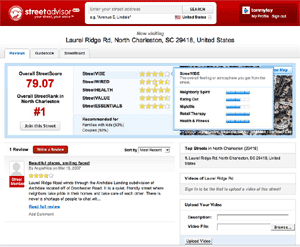 StreetAdvisor is a new entry in the plethora of rating services popping up all over the internet. Some ask us to rate what we buy, the places we go, and even each other. This Australian startup applies ratings to your neighborhood.
StreetAdvisor is a new entry in the plethora of rating services popping up all over the internet. Some ask us to rate what we buy, the places we go, and even each other. This Australian startup applies ratings to your neighborhood.
StreetAdvisor is a search engine for neighborhood reviews. Reviews are broken down by street and composed of narrative, video, and ratings based on 22 factors of appeal (reminds me of eHarmony). The factors are mashed into an overall score and also broken into five star ratings across 5 categories: vibe, wired (communications connectivity), health (environmental quality), value, and essentials (utilities and services). You can search for neighborhood ratings by search box, or browsing a Google map with push pins marking the different reviews. Browsing the map lets you choose which of the 22 factors are most important to you by slider bar, with more relevant reviews having larger pin heads.
 The site also incorporates some community features for added stickiness: a “guidebook” and “streetboard”. The guidebook serves as a place to write generic posts that didn’t fit into the 22 factor review. The streetboard is a communal board that serves as a place to converse with your neighbors through topic threads or general “shouts” to the crowd. The two features are a start, but not near the depth of community discussion you can get from an Outside.in or Smalltown.
The site also incorporates some community features for added stickiness: a “guidebook” and “streetboard”. The guidebook serves as a place to write generic posts that didn’t fit into the 22 factor review. The streetboard is a communal board that serves as a place to converse with your neighbors through topic threads or general “shouts” to the crowd. The two features are a start, but not near the depth of community discussion you can get from an Outside.in or Smalltown.
I can understand the need for these neighborhood ratings, startups like Zillow and Trulia have done a good job of monetizing the quality of a neighborhood, but are relatively poor at capturing the intangibles. However, I don’t understand how they will motivate enough users to participate and make the service really useful. Neighborhood ratings don’t strike me as something a broad audience is particularly passionate about and rely on only a small pool of contributors for each review. Qualified neighborhood reviewers don’t reside all over the city like Yelp’s army of restaurateurs, but are instead a small group of people that live on the street in question. Reaching at least one person on each street across the 26 countries they cover and motivating them to review their block is a daunting task indeed.